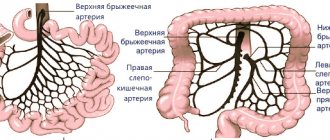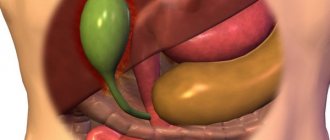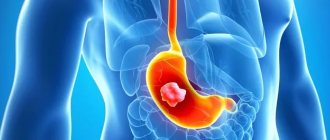Hello everyone, dear friends!
During the New Year holidays, we leisurely moved from one holiday table to another. The abundance of tasty but unhealthy food forced us to break our diet and forget about regular training for a while.
Naturally, there are exceptions from the general mass of people - avid athletes began visiting gyms on January 1st.
However, we mostly lack the willpower to refuse the famous Olivier with mayonnaise or a glass “for world peace” in the presence of cheerful friends or close relatives. Ironic, isn't it? ?
It is not surprising that many people have stomach ache in the morning, heartburn torments us, and bloating and regular gases put us in an awkward situation.
What to do about it? Today I propose to identify products to improve digestion, the presence of which at the holiday table will be the key to a “good morning” for the whole family.
Why is digestion disrupted?
Most often, the following factors lead to interruptions in digestion:
- Smoking. Thanks to this habit, a large amount of dangerous toxic substances regularly enter the human body, which not only negatively affects the lungs, but also affects other organs, in particular the intestines. In addition, a person who smokes has a dull sense of smell, so when eating, his stomach secretes much less digestive juices. This in turn leads to the development of gastritis, cholecystitis, etc.
- Frequent consumption of alcohol also negatively affects digestion, since it slows down the metabolic process and puts additional stress on the liver and stomach.
- Stress can greatly disrupt the digestion process because it causes spasms in the internal organs. In addition, it is because of nervous overstrain that a person can eat uncontrollably (overeat, eat junk food, starve, etc.).
- A sedentary lifestyle by the age of thirty-five leads to constipation and slow digestion (food in such people can be digested within four days).
- Unbalanced diet.
- Insufficient or improper cooking of food (eating raw meat, fish, etc.).
- The presence of inflammatory processes in the intestines or digestive organs (hepatitis, jaundice, pancreatitis, acute ulcers, cholecystitis). Such conditions are especially dangerous when they are not treated with medication.
- Pregnancy (due to compression of the digestive organs by the enlarging uterus).
- Enzymopathy (a chronic or acute condition in which a person suffers from a lack of beneficial enzymes that help digest food).
- Chronic diseases (diabetes mellitus, immunodeficiency and others) can lead to interruptions in digestion.
- Bacterial or infectious intestinal infection.
Folk remedy for cleansing the stomach
If you are constantly bothered by epigastric discomfort, then try a popular and proven folk remedy for cleansing the stomach. These are whole flax seeds. Their spectrum of action is universal; flax is good for healing both the stomach and all parts of the intestines. How can flax help? Improve gastric digestion with folk remedies, reduce the manifestations of pathogenic microflora, speed up the healing process of the walls in case of erosion or gastritis, ulcers. Also, the seeds, secreting mucus, have an antiseptic property. Flax seeds are also indicated for chronic constipation, since mucus improves peristalsis. It is also a gentle remedy for gas in the stomach.
How to properly prepare flax seeds:
- They need to be soaked 8-10 hours before the planned appointment.
- You cannot grind flax seeds - take them only in their whole form.
- Use no more than 2 tablespoons at a time.
- Soak the seeds with water at room temperature.
- Pour water into a glass to cover the seeds by 1 cm.
Causes of stomach disorders and how to avoid them
digestive organs (including the gallbladder and liver) break down food and deliver nutrients to cells and remove harmful toxins. The most common causes of digestive disorders are associated with poor diet, stress and a sedentary lifestyle. And this is a direct path to weakened immunity.
The first symptoms of such disorders are nausea, stomach cramps, heartburn, constipation or diarrhea. There is no need to ignore them. Of course, with the availability of an assortment of modern medical drugs, judging by the advertising, you can eat anything in any quantity, and then take a life-saving pill - and the problem is solved. But it's not that simple in reality. In order for the digestive system to work like a clock, we must take care of regular balanced nutrition and a healthy lifestyle in general.
How does a modern business person, busy at work from morning to evening, eat? Irregular and spontaneous! Or in general we eat once a day, tightly and at night. And then we get upset, looking at the scales, because in this diet there is nothing healthy and our diet is devoid of essential vitamins and minerals, rough natural food, and fiber. We thus overload the digestive system and disrupt its functioning. Rarely does anyone, without a “push” from the body, of his own free will, think about proper, systematic nutrition.
To prevent minor digestive system disorders from developing into chronic diseases, take note of a few simple rules. Set your diet and stick to it strictly. Many people write about the benefits of breakfast, but for some people it is not at all enjoyable or beneficial. It may be enough for you to drink green tea in the morning, but you will want to have a snack (read the article about the right healthy snack) after a couple of hours. Our body is individual, look for your personal nutritional methods, but under no circumstances rely on “maybe”. Listen to your desires, but indulge them wisely!
Herbal infusions that can be bought at a pharmacy for the stomach
Depending on the location and nature of the problem, various herbs are used.
For pain
For pain in the stomach area on the left or right, it is useful to use the following recipes:
- Chamomile. The following anti-inflammatory remedy will help relieve paroxysmal pain in the stomach: take 1 dessert spoon of dried chamomile flowers, add 1.5 glasses of water. Let the medicine stand for a while (until it cools completely). Drink 150 ml before each meal throughout the day.
- Gooseberry. You should take 1 spoon of fresh or dried gooseberries, add 1 glass of water to them. Let it cook, boil over low heat for 10 minutes. Take 300 ml of this medicine. (3 times a day).
- Blueberry. You need to take 3 tables. spoons of dry or just picked blueberry fruits, pour in 1 liter of just boiled water. Keep covered for 1 hour. You need to drink 300 ml of this infusion. (4 times a day). It is also better to add a small amount of honey to it.
These medications help relieve stomach and intestinal pain.
For gastritis
- Watch, mint, yarrow. Mix all ingredients in equal quantities. Pour 1 dessert spoon of herbs with water and boil for 5 minutes. Leave to stand for approximately 15 minutes. Take 50 ml of prepared decoction (3 times a day).
- Chamomile, fennel, cumin. Take the components in equal quantities and mix thoroughly. 1 tbsp. l. pour 350 ml of herbs. boiled water. Set aside for half an hour, take the medicine warm (3 times a day). A fresh decoction should be prepared each time.
- Aloe. For gastritis with high acidity, you should take 2 teaspoons of pure aloe juice before each meal. Important! In order for aloe juice to provide maximum benefits, you need to drink it only freshly prepared!
- Calendula. Pour 1 small spoon of flowers into 1 glass of just boiled water. Remove until completely cool. Use 3 times a day (100 ml).
Such recipes will help to avoid exacerbation of gastritis for a long time.
Antibiotics destroy normal intestinal microflora. To improve the condition, the following recipes are useful while taking antibacterial drugs:
- Burnet root. You will need 200 g of this ingredient, add 1 glass of purified water. Let it simmer on low heat for 20 minutes. Take the prepared decoction 1 small spoon (6 times a day). The duration of therapy is at least 30 days.
- Dill seeds. You will need 4 teaspoons of dill seeds, add 1 cup of boiling water, leave for 2 hours. This medicinal infusion is drunk 1 table at a time. spoons (6-8 times a day).
- Calamus root and plantain. Mix the components in equal quantities. Pour 2 tablespoons of the resulting mass with 1 glass of boiling water, set aside for 30 minutes. Drink 50 ml of medication (3 times a day) for at least 1 week.
Herbs for stomach diseases are also used for preventive purposes to avoid exacerbations.
| Name | Compound | Price | Indications |
| Fitogastrol | Chamomile flowers, peppermint leaves, fragrant dill fruits, calamus roots, licorice roots | 80-100 rub. | Gastritis, gastric and duodenal ulcers, colitis |
| Phytohepatol | Chamomile flowers, peppermint, fragrant dill fruits, calamus roots, licorice | 80-90 rub. | Stomach and intestinal disorders, peptic ulcer of the stomach and duodenum, ulcerative colitis |
| Herbal tea “For gastrointestinal diseases” | Rose hips, nettle leaves, St. John's wort, plantain, peppermint, knotweed, chamomile, yarrow, thyme | 90-100 rub. | Constipation, dyspeptic disorders, flatulence |
By correctly using various types of plants, you can normalize the functioning of internal organs, the digestive processes occurring in them, stimulate the healing of damaged tissues, relieve symptoms of inflammation, restore microflora, and get rid of pathogens.
As an auxiliary measure, herbal medicine is used to treat pathologies such as gastritis, dyspepsia, peptic ulcers, and dysbiosis. Sometimes doctors, along with pharmaceuticals, also prescribe herbal medicines. As a rule, the latter are unable to influence the original source of the disease, but effectively influence its manifestations.
You should not use herbal infusions and preparations until a final diagnosis has been established. For example, herbal decoctions that have an analgesic effect used for abdominal pain may prevent the doctor from determining the root cause of the disease.
There are many herbal medicines that normalize the condition of the gastric and intestinal mucosa, reduce or increase the acidity of the internal environment, effectively destroy pathogenic microorganisms, and restore peristalsis of internal organs. Let's look at the most popular herbal remedies.
Calamus marsh
The roots of the plant have an antiseptic, antibacterial, strengthening effect, and eliminate the effects of inflammation. Calamus drink enhances gastric secretion and has a choleretic effect. These properties, coupled with stimulation of the smooth muscles of the hollow organs, improve digestion. Usually, a decoction of calamus rhizomes is recommended for intestinal inflammation.
For one large spoon of crushed raw materials, take 200-250 ml of boiling water. Next, the drink is placed in a water bath, where it simmers for a quarter of an hour. Then the infusion is cooled, filtered and consumed 50 ml 15 minutes before meals 3-4 times a day.
pharmaceutical camomile
The flowers of this plant are used in the treatment of a wide range of pathologies: inflammation of the stomach walls, intestinal colitis, dysbacteriosis, irritable bowel syndrome. The medicine has an anti-inflammatory, disinfecting effect, and relieves pain. The course of treatment is long and lasts one to three months.
To prepare the infusion, take two large spoons of the crushed plant, pour in 200 ml of hot boiled water, infuse the resulting mixture for a quarter of an hour, and squeeze. Then the volume is adjusted to 200-250 ml.
Instead of infusion, you can use a 20-minute water bath. Then you need to wait until the broth has cooled, strain it, and bring the volume to 250-350 ml.
Adults take the medicine half a glass twice a day during or after meals. Or a third of a glass three times a day. Recommended dosage for children: one tablespoon 3-4 times a day.
The leaves and stems of this ubiquitous plant have analgesic and anti-inflammatory effects. In addition, the infusion promotes the active production of digestive enzymes.
For gastritis, one tablespoon of herb is infused for half an hour in a glass of boiled water, take 100 ml three times a day before meals.
The juice of the plant has proven itself well in the treatment of intestinal diseases. The green parts of the yarrow should be thoroughly washed, slightly dried, and juice prepared, which is consumed one small spoon three times before meals. It is not recommended to store juice for more than two days.
Fennel
Known for its analgesic and antimicrobial effects, the plant is also a versatile diuretic and laxative. It is advisable to use fennel infusion to relieve spastic pain, reduce signs of flatulence, and normalize intestinal motor function.
Brew one teaspoon of dry herb in 200 ml of boiling liquid, leave for 30 minutes. Take the medicine half a glass three times a day half an hour before sitting down at the table.
Flax seeds
The product has an enveloping effect, protects damaged stomach walls, reduces inflammation, and promotes healing of irritated tissues. It has a slight laxative effect on the intestines. Flax is effective for diseases such as gastritis, stomach ulcers, colitis, and enteritis.
Flax seeds in the amount of 3 large spoons are poured into ⅔ cup of boiling water and left for two to three hours. Before each meal, it is recommended to consume 2 tablespoons of the slimy drink. You should not drink a stale infusion: over time, most of the beneficial properties of soaked flax are lost.
The optimal solution for dysbacteriosis is a mixture of herbs that destroy pathogenic bacteria and normalize intestinal flora: sage, St. John's wort, yarrow, chamomile. Mix equal amounts of ingredients in a crushed state. 1 tbsp. Pour a glass of boiling water over the plants and simmer in a water bath for a quarter of an hour. Drinking the drink is recommended warm.
Herbs such as dried yarrow, horsetail, and wormwood also effectively fight microbes. Mix the components in proportions: 20 grams - 20 grams - 10 grams, respectively. Brew boiling water (2 cups) and leave for one to two hours. Take the medicine during meals, half a glass.
For constipation at home, prepare a mixture of dried fruits: figs, prunes, dried apricots (100 grams each). Honey in an amount of 100 grams and senna leaf (150 grams) are added to the medicine. Take 1-2 dessert spoons at night with warm water (⅓ glass). Patients with diabetes should consult a doctor!
Mint leaves, valerian roots, and dill seeds also have a laxative effect. For a liter of boiling water, take 5 large spoons of herbs mixed in equal amounts. The infusion is prepared for several hours. And they drink it a quarter glass 3-4 times a day.
The prescribed dosage must be strictly followed. Herbal medicines, depending on their effect and the degree of neglect of the disease, are initially used in small quantities, then the dosage is increased.
A properly selected herbal remedy can be an effective method for various diseases. The choice of herbal remedies will depend on the diagnosis:
- therapy for colitis is complemented by infusions of chamomile and sage;
- for gastric and duodenal ulcers, chamomile, calendula, clover, and licorice root are prescribed;
- potato and cabbage juices are indicated for gastritis;
- St. John's wort and yarrow effectively fight signs of dysbacteriosis;
- for functional intestinal diseases, in particular irritable bowel syndrome, decoctions of horsetail, caraway fruits, fennel or centaury are used.
Symptoms of indigestion
It is usually accompanied by the following symptoms:
- feeling of heaviness and discomfort after eating;
- frequent nausea;
- diarrhea;
- bloating;
- pale skin;
- abdominal pain;
- heartburn;
- constipation;
- headache;
- sudden weight loss;
- weakness.
One of the signs of a digestive system disorder is abdominal pain. Doctors say that this phenomenon occurs due to functional dyspepsia, that is, a pathology in which food does not move from top to bottom, but in the opposite direction. This means that there are deviations in the functioning of the muscular apparatus of the stomach.
https://www.youtube.com/watch?v=Ln-Kc696ty8
When digestion is slow, the following symptoms occur:
- reflux;
- diarrhea;
- bloating;
- discomfort in the stomach after eating, expressed in the navel or solar plexus;
- rapid weight loss or severe weight gain;
- very rapid dulling of hunger after eating a small amount of food;
- lack of appetite.
Factors that adversely affect digestion are:
- improper, unbalanced diet, in particular, the inclusion of a large amount of baked goods in the diet and the almost complete absence of fiber-rich foods;
- eating food in a hurry;
- the habit of eating large quantities at night, especially after fasting during the day;
- age-related changes that weaken the functioning of the stomach;
- coffee abuse, smoking, addiction to alcoholic beverages;
- long-term use of antibacterial drugs.
Healthy recipes
And now briefly about foods that improve digestion and recipes with them.
A product useful for digestion is beets - raw or boiled, if you eat them on an empty stomach, only 100-150 g every day, as well as apples - you should eat 2 of them a day (or at least one, but on an empty stomach, in the morning ).
Many foods that improve digestion help regulate bowel movements. A decoction of rice or dried pears helps with diarrhea; for constipation, you need to take onion tincture: chop the onion, put it in a 0.5 liter bottle so that it is 2/3 full, and fill it with vodka. Leave for 10 days, shaking occasionally. Take 10 drops before lunch.
Pumpkin pulp mixed with honey improves digestion and relieves constipation. For colitis with insufficient bowel movement, porridge made from millet and pumpkin pulp, cooked with honey, is very useful: it not only improves bowel function, but also has a mild diuretic effect.
Strawberry juice regulates liver function; if you drink it on an empty stomach, you can simply eat a handful of berries.
Gymnastics to normalize digestion
While performing the gymnastics described below, you need to breathe calmly and evenly, control the ratio of respiratory movements to physical ones, and be in the most calm state.
- Place your palms on your stomach. While performing smooth breathing movements, feel the vibrations of the upper abdominal wall and diaphragm.
- Place your palms so that the little finger of your right hand is on the navel, and the thumb is on the chest. Place the palm of your left hand in your lower abdomen. Take several deep breaths and exhales, while exhaling air, slightly tightening the lower abdomen.
- Pull your legs towards your stomach and clasp them with your arms. Fix your body in this position and breathe calmly. Remaining in a horizontal position, pull your feet towards you and then away from you. Perform all actions gradually and smoothly. Then take several even breaths and exhalations.
- Walk in place, rhythmically moving your hips and buttocks. Your arms should swing in rhythm with your walking. Then make several jumps, alternately with one leg, then the other, then with both. Do it all over again. Watch your breathing.
- Lying on your back, lower your legs and move your hand over your stomach, moving clockwise, in a spiral, in the direction from the navel to the sides. Bend your legs at the knees and repeat the steps above. Then place your palms on the sides of your abdomen and move them lightly to the right and left.
- Lying on your back, fix your hand on the area of the body just below the navel, bend your fingers and move them over the skin several times. Alternately perform the exercise with your right and then with your left hand, moving clockwise. Then place your palms on the lower abdomen (thumbs should be near the navel) and lightly pinch the skin.
- While standing, slightly relax your abdominal muscles. Without straining, jump to a small height on one or the other leg, and then on both.
- Get out of bed and walk around the floor. Movements should come not from the knee joints, but from the hip joints. Your hands need to be relaxed. The effectiveness of this exercise is explained by the activation of the abdominal muscles, normalization of metabolism and stimulation of the digestive system.
- Lower your legs, stroke your stomach, moving clockwise. All movements should be superficial and light.
- While standing, rotate your torso from right to left. In this case, your feet should be shoulder-width apart and your arms should hang freely. This exercise improves digestion, since during it special contractions of the intestines occur.
For the first few days, all the exercises described above should be done 8 to 10 times. After one or two weeks, it is recommended to increase the number of approaches to 15-20. It is advisable to exercise after waking up and at night. This will not only help normalize digestion, but also promote proper sleep.
What can you drink for your intestines?
To normalize the functioning of the intestines and stomach, people can take medications prescribed by specialists, for example, tablets:
- "Linacotide".
- "Motilium".
- "Mukofalka."
- "Duflac".
- "Lactiol".
- "Lactrofiltrum".
- "Hilak Forte".
- "Festala", etc.
To normalize the intestinal microflora, patients are recommended to take a course of probiotics and prebiotics.
How to make your own bitters
If you have time, you can make your own bitters. You will need bitter herbs (such as artichoke leaf, burdock root, angelica root, dandelion root, etc.), alcohol (at least 60 degrees), storage jars, a strainer, a cutting board and a knife.
Instructions
- Cut the plants into small pieces and place them in a jar. Note: If you have several plants, you can either mix them all together in one jar, or store them in separate jars and mix later. The disadvantage of mixing early in the process is that different plants may dissolve into the alcohol at different rates.
- Add alcohol and make sure the plants are completely submerged. Seal the jars with lids and store them in a cool, dark place.
- Shake each jar daily for about 10 seconds.
- Since infusion rates vary depending on the plant, this can result in lengthening the preparation time of the tincture from one day to several weeks. You can test the readiness of tinctures by taking a few drops or smelling them. As soon as the liquid reaches a tart smell or becomes bitter enough, your tincture is ready.
Once your bitters are ready, filter the mixture (cheesecloth works well). From now on, you can combine different tinctures by mixing them together, adding a few drops to food, tea, other drinks, or using them as you wish. The finished tincture can be stored and be good for about a year.
What foods promote good digestion?
- A variety of porridges: oatmeal, millet, buckwheat, rice;
- Lactic acid products: milk, kefir, sour cream, cheese. But unglazed cheese curds, dairy desserts and yoghurts;
- Chicken and quail eggs;
- Poultry, lean beef, but not sausages, frankfurters or small sausages;
- Sea and river fish. If you want to enjoy lightly salted trout or salmon, salt the fish yourself. Honestly, it will be healthier - no paint, no preservatives;
- Vegetable oil (various types), butter, but not margarine;
- Fruits, vegetables, berries - without restrictions (for most people);
- All food is consumed boiled or stewed, but not fried or smoked. Fruits and vegetable salads – raw;
- Don't forget about water. At least two liters of clean water per day should be in your diet.
Of course, I haven’t listed everything. The main thing is to exclude all semi-finished products, cuts, flour and confectionery products from your food. Food should be simple, not too high in calories.
Maintain food hygiene! Three meals a day and two small snacks with fruits, nuts, natural juices. If you do sometimes experience symptoms such as heartburn, bloating, constipation, then do not neglect them. They shouldn't exist! This is UNHEALTHY! Urgently improve your diet, engage in physical exercise and sports, and support yourself psychologically.
Otherwise, heartburn will gradually turn into gastritis and ulcers, bloating into enzymatic deficiency and chronic pancreatitis. Do you need this? In fact, constant digestive problems are a PRE-ILLNESS!
Therefore, I want to emphasize once again - watch your diet and the sensations you experience during and after eating. To improve digestion and prevent the development of chronic diseases, use time-tested folk recipes.
Diet and dishes for digestion: recipes
Recipes for healthy dishes
Recipe for boiled beet salad:• Boil two small beets and cut them into strips• Grate the carrots on a coarse grater and chop the Chinese cabbage• Transfer everything into a large bowl and season with sunflower oil• Salt and pepper the dish and, if desired, add walnuts to it nuts• Salad can be either a separate dish or an addition to baked fish or meat
Recipe for dietary steam cutlets:• Prepare minced chicken or turkey• Add salt, pepper and a large handful of herbs to it• Stir the minced meat and beat it a little• Form small balls and place them in the boiler• After 10-15 minutes, the cutlets will be ready• Eat This meat dish is best served with fresh vegetables.
Since mechanical, chemical or thermal irritation of a diseased stomach by consumed food is unacceptable, it is necessary to follow a gentle diet.
The following recommendations must be followed:
- Observe the frequency of meals. It is recommended to eat food 5-6 times a day in small portions to create an even load on the digestive system.
- Exclude from the menu substances that irritate the gastric mucosa. This group includes: strong broths based on meat or fish, any fried food, canned foods, smoked meats, seasonings and spices (hot peppers, garlic, onions), pickles, marinades, carbonated foods, wines, coffee, citrus fruits. There is no point in giving them up, but it is necessary to limit them. Food should be well chewed and served at a temperature close to or slightly higher than body temperature.
- Add foods to your diet that can bind and neutralize hydrochloric acid. Such medicinal products are eggs, milk and dairy products, boiled meat and fish.
- Use enveloping agents (jelly, porridge, mousse, jelly, grated or baked apples).
- Give up bad habits (alcohol and smoking).
It is also extremely important to eat in a calm environment and at a measured pace (chewing well and covering each lump of food with saliva), without being distracted by extraneous stimuli (cell phone, TV, conversations).
Radish
Essential bitter oils of radish have a very good effect on digestion. In general, radishes are considered one of the main products for restoring metabolism and accelerating digestion. It is extremely useful for obesity, as it stimulates the secretion of gastric juice and removes excess cholesterol from the body.
But you need to be careful with radishes, as they are contraindicated for diseases of the kidneys, liver and gastrointestinal tract (gastritis, etc.)
What will help reduce gas formation
Since the pancreas is not yet capable of producing all the necessary enzymes, the baby’s nutrition should be as correct and regular as possible. If you do not want your baby to develop nausea or diarrhea, then make sure that he eats only healthy foods.
Recommendations that will help improve your child’s digestion:• Introduce new foods into your baby’s diet gradually• At the initial stage, you can heat-treat vegetables (meaning carrots and cabbage)• Give your baby as much clean water as possible• Make sure your baby doesn’t drink too hot or cold food• Give your child fermented milk products regularly
Flatulence is a common companion for patients with stomach problems. According to statistics, every third person on the planet suffers from bloating and gas.
These symptoms clearly indicate digestive problems. The solution is again in the fiber. But not all provisions are suitable for those who are tormented by flatulence. For example, legumes, although rich in plant fiber, still cause fermentation. You will also have to give up apples, grapes, corn, and zucchini, in any form. You’ll even have to forget about compotes for a while.
For flatulence, the menu should include:
- Barley, buckwheat, oatmeal and semolina porridge;
- Carrots, pumpkin, beets;
- Apricot, prunes;
- Flaxseed and oil.
If you have problems buying fresh fruits, you can replace them with dried ones, but they still have less healing properties. When choosing drinks, you should give preference to those that do not contain a lot of salt and sugar.
It is better to take juices without added sugar, and chicken and vegetable broths with a minimum amount of salt. Before purchasing mineral water, you should carefully study its composition on the label, since not all natural drinks are universal and have no contraindications.











